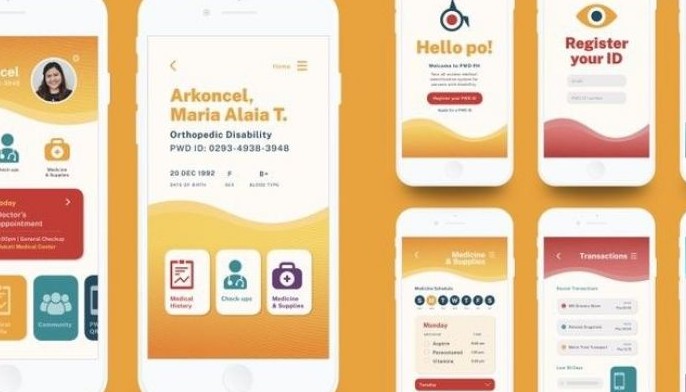MANILA, Philippines — One Filipino design student designed a new person with disability (PWD) identification card, along with a mobile application for her undergraduate thesis.
Aia Arkoncel, a PWD herself, said she felt that it was her duty to give back to the disability community through design.
"I have a physical disability so my wheelchair is visible, obviously. But it was such an eye-opening experience to know that other PWDs were being discriminated against just because they don't 'look disabled'," she told Philstar.com in Filipino in an online exchange.
RELATED: Social distancing's victims: In a Luzon quarantine, the disabled are mostly forgotten | 'Easy to overlook': Social amelioration lapses weigh doubly on PWDs, advocates say
The redesigned and color-coded PWD IDs have visual cues on a person's disability, while the application would include a user's "medical profile, discounted transactions, reminders for your meds and check ups, and a feature that connects you with the community for extra support—whether medical or emotional."
"I wanted to empower PWDs by upgrading to a system that makes it more efficient and accessible for them," she wrote in her post.
The term “person with disability” covers a wide range of afflictions that can range from psychosocial and mental disabilities to verbal and hearing impairments, both of which are usually not immediately visible ailments.
A study by the University of the Philippines Center for Local and Regional Governance (UP CLRG) noted that “standardizing the classification of disabilities” was a “global concern.”
"Even if you don’t have an ID yet, you can apply for it through the app. There are a lot of PWDs who are not able to physically go to their city halls and apply for a card," she said.
This ID connects to the PWD PH app. Even if you don’t have an ID yet, you can apply for it through the app. There are a lot of PWDs who are not able to physically go to their city halls and apply for a card. This feature makes it accessible for them to do so. (3/5) pic.twitter.com/Wwg4qlgKhT
— Aia ???? (@aiaaaa) May 31, 2020
Over the past two months of the enhanced community quarantine, countless PWDs reported that they were not included in the Department of Social Welfare and Development's social amelioration program because they were not registered PWDs.
In October of last year, Rep. Eric Go Yap (ACT-CIS Party-list) encouraged establishment owners to take pictures of PWDs they suspect of being fakes, after reports surfaced of some Persons with Disabilities Affairs Office selling illegitimate cards, which entitle holders to a number of discounts, among other benefits.
Advocates found this pronouncement unfair, saying it baselessly puts the burden on actual PWDs to prove their being disabled despite already being recognized by the state as such by virtue of the very card being disputed.
Lapses in the system of handing out PWD cards are among the most prominent issues the sector struggles with today.
"My hope is that by upgrading to this system, it empowers PWDs to have a bit more direction and control over their lives, and it gives them [the] confidence to live it out to the fullest," she wrote.
PWDs (including myself) sometimes feel like so much of our lives are not in our control. My hope is that by upgrading to this system, it empowers PWDs to have a bit more direction and control over their lives, and it gives them confidence to live it out to the fullest. ? (5/5)
— Aia ???? (@aiaaaa) May 31, 2020


